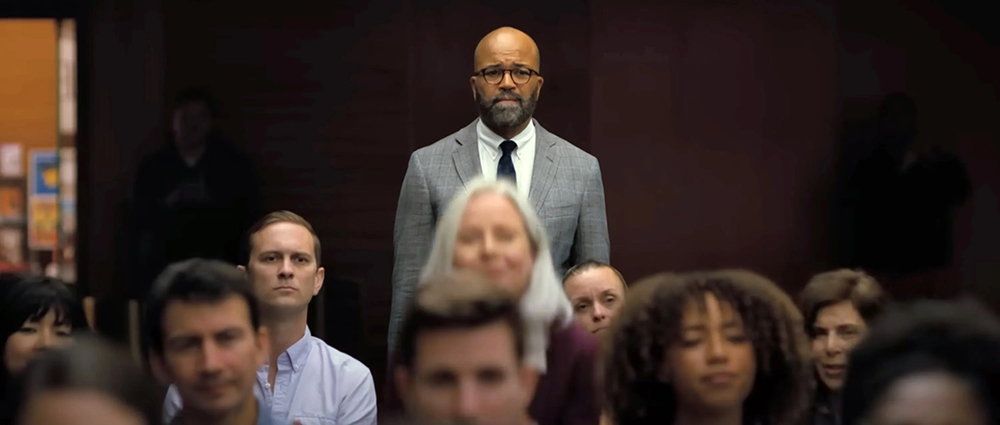Thelonious “Monk” Ellison (Jeffrey Wright) has a big problem in American Fiction. He’s a writer and English professor, but his latest book is not going over well with publishers. It’s long and complicated, full of mythological symbols and classical references. Not exactly a recipe for a bestseller, but he’s got an audience, and it’s enough for Monk to get by in the publish-or-perish world of academia.
That’s not enough anymore, says Monk’s agent Arthur (John Ortiz). It’s got to be bold, direct, honest, from the street. That’s what readers want from Black authors these days — realness. But the trouble is, Monk’s book is honest and from the heart. His family is all well-to-do professionals. His sister Lisa (Tracee Ellis Ross) and brother Cliff (Sterling K. Brown) are both doctors, and his retired mother Agnes (Leslie Uggams) lives on Cape Cod. His “real life” isn’t what people expect from a Black writer.
He is painfully reminded of what they do expect when Arthur suggests he attend a reading of the latest bestseller by Sintara Golden (Issa Rae), We’s Lives In Da Ghetto. The narrative is wall-to-wall Black trauma porn. The almost impenetrable dialect Sintara writes in is nothing like her reserved urbane speaking voice. It’s all a put-on by someone trying to fake authenticity by giving the predominantly white audience’s own preconceptions back to them.
Monk is jolted out of his professional bubble when Lisa dies unexpectedly from a heart attack, and he is forced to help arrange her funeral with his cokehead brother and Agnes, who is showing the first signs of Alzheimer’s. He takes a little comfort with Coraline (Erika Alexander), the lawyer who lives on the beach next to his mom.
To vent his frustrations, Monk bangs out a sloppy potboiler filled with stories of urban poverty, crime, and social dysfunction told in transparently fake street slang. He submits it to his agent as a final raised middle finger to the publishing industry. But to his surprise, Arthur loves it. When he shops My Pafology around to publishers under the name Stagg R. Leigh, a bidding war erupts. Since Monk’s terminally square appearance would undermine the “authenticity” of the product, he claims to be a gangsta on the run from the law and refuses to make public appearances. Stagg R. Leigh’s book advance is staggering — which is good because Monk needs the money to pay for his increasingly frail mother’s care.
Monk’s bitter kiss-off has become the biggest success of his career — and a publishing sensation. But Monk soon realizes that he can’t tell anybody he’s Stagg R. Leigh, or the whole bubble will burst. Even worse, isn’t he now just perpetuating and profiting from the same harmful stereotypes he was raging against in his satire? At what point does “satire” end and “realistically absurd” begin?
It’s that last question that American Fiction ultimately applies to itself. Monk gets cold feet and tries to sabotage his fictional career with increasingly outlandish pronouncements and behavior. But each escalation is met not with condemnation but rapturous applause. Writer/director Cord Jefferson, who won an Emmy for his writing on the 2019 HBO series Watchmen, adapted Percival Everett’s 2001 novel Erasure into American Fiction, which just goes to show you that the complex questions of representation and stereotyping have been knocking around long before the moral panics of the 2020s.
Jefferson keeps it balanced between the outlandish and the real by going back and forth between Monk’s personal travails — a deteriorating family life and a fraught new romance — and the increasingly outrageous, yet plausible, arc of his meteoric writing career. Then finally, like his protagonist, the movie tries to sabotage itself to see how far you’ll go along. It’s a virtuosic writing job which wouldn’t have worked without a virtuoso performance by Jeffrey Wright. American Fiction is at its funniest when it’s all too real.
American Fiction opens in theaters this Friday.
